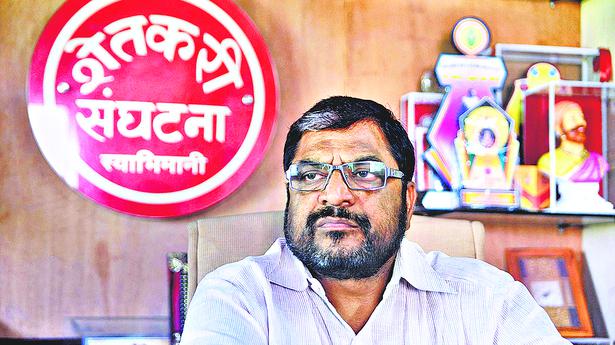
Will another change of allies yield political dividends for Raju Shetti?
The Hindu
Will provide an alternative to rural electorate in 2024, says farmer leader after exit from MVA
The recent exit of MVA ally and Swabhimani Shetkari Sanghtana (SSS) chief Raju Shetti from the ruling coalition in Maharashtra has evoked scarcely a whimper amid the high decibel political war of words over raids by central enforcement agencies on ministers and their extended families.
When NCP chief Sharad Pawar was asked about the possible consequences of Mr. Shetti’s exit at a recent press conference in New Delhi, he merely shrugged and observed that the farmer leader had been disenchanted with the State government for a while now.
Meanwhile, Mr Shetti — twice MP from Hatkanangale in Kolhapur and formerly allied with the BJP — now considers himself a “free man”, not bound by any ties to the four major parties [BJP, Shiv Sena, Nationalist Congress Party, Congress] in the State.
Mr. Shetti insists that despite his shifting alliances — first with the BJP (until his exit from the NDA in 2017) and later with the NCP and the Congress — his core base of 4.5 lakh-odd voters in the ‘sugar belt’ of Satara, Sangli and Kolhapur districts remains intact. He insisted that the SSS and its political wing, the Swabhimani Paksha, were still a force to reckon with in Maharashtra politics.
“Agricultural inputs, be it fertilizer cost or diesel prices, have risen by a staggering 25% in less than three years. Neither the BJP-led Centre nor the three parties of the MVA have done anything to alleviate the plight of farmers other than utter shallow promises. All four parties have betrayed the farmers,” he told The Hindu.
Be it the issue of paying a fair and remunerative price (FRP) to farmers in one single instalment, adequate compensation to farmers hit by the 2019 Kolhapur-Sangli floods or waiving off electricity bills, the Uddhav Thackeray-led MVA has proved a major disappointment, Mr. Shetti said.
Henceforth, the focus of the SSS would be on rebuilding the farmers’ movement in Maharashtra, particularly in the western region which is the stronghold of the State’s ‘sugar barons’, and offering an alternative to the rural electorate in there, he said.





















 Run 3 Space | Play Space Running Game
Run 3 Space | Play Space Running Game Traffic Jam 3D | Online Racing Game
Traffic Jam 3D | Online Racing Game Duck Hunt | Play Old Classic Game
Duck Hunt | Play Old Classic Game











